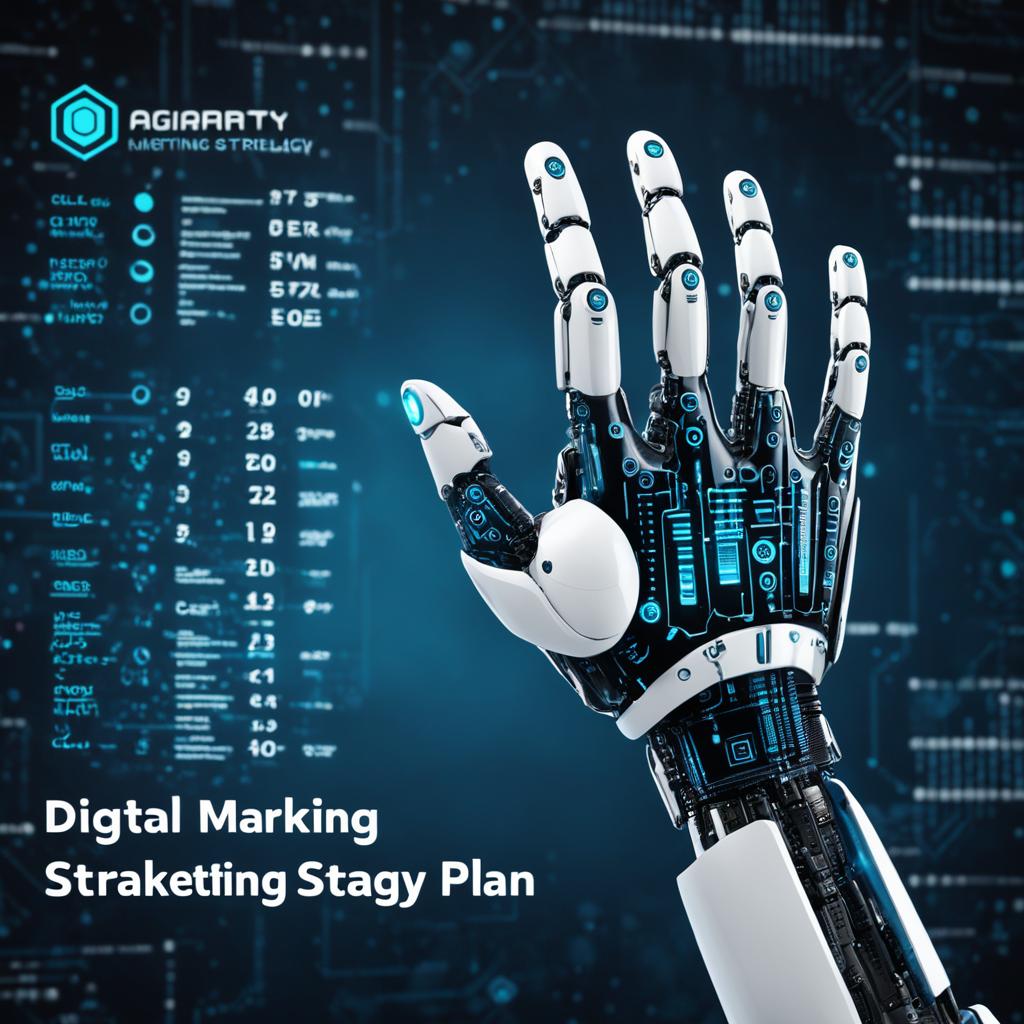Starting a digital marketing agency with no prior experience might seem daunting, but with the growing digital advertising industry, there is an opportunity for newcomers. The global digital ad spend is projected to reach $645 billion by 2024, making it a lucrative field. However, starting a successful digital marketing agency requires careful planning, market research, building a skilled team, and effective pricing strategies.
Key Takeaways:
- Take advantage of the growing digital advertising industry.
- Plan and conduct thorough market research.
- Choose a niche and determine the type of agency.
- Register your agency as an official business.
- Build an attractive website and establish a strong social media presence.
The Importance of Conducting Market Research
Before starting a digital marketing agency, it is crucial to conduct thorough market research. This process plays a key role in identifying market demand, understanding audience needs, and analyzing the competition. By conducting comprehensive market research, you can gain valuable insights that will guide your agency’s strategies and help you stand out in the competitive digital marketing landscape.
Identifying Market Demand
Market research allows you to identify the demand for your services within the digital marketing industry. By analyzing market trends, industry reports, and customer preferences, you can gain a clear understanding of the services that are in high demand. This knowledge will enable you to align your agency’s offerings with market needs and position yourself as a valuable solution provider.
Understanding Audience Needs
Market research helps you understand the needs and preferences of your target audience. By conducting surveys, analyzing customer data, and studying competitor strategies, you can gain valuable insights into what your potential clients are looking for. This knowledge will enable you to tailor your services and marketing efforts to meet their specific needs, increasing your chances of attracting and retaining clients.
Analyzing the Competition
Analyzing the competition is a vital aspect of market research. By studying the strategies and offerings of your competitors, you can gain insights into their strengths and weaknesses. This information will help you differentiate your agency by identifying unique selling points and positioning yourself as a better alternative. Understanding the competitive landscape will allow you to develop effective strategies that give you a competitive edge in the market.
Conducting market research is essential for starting a successful digital marketing agency. It enables you to identify market demand, understand audience needs, and analyze the competition. By conducting thorough research, you can make informed decisions that will guide your agency’s growth and ensure its long-term success.
Market research for a digital marketing agency can be conducted through various methods. Online surveys, industry publications, and attending industry events are great ways to gather valuable data and insights. It is also essential to leverage digital marketing tools and analytics to gather information about customer behavior, search trends, and competitor strategies.
Specializing in a particular niche is another strategy that can help increase the success of your agency. By focusing on a specific area within the digital marketing industry, you can become an expert in that field and cater to the unique needs of your target audience.
Overall, conducting market research is a critical step in starting a digital marketing agency. It provides you with valuable insights that inform your decisions and help you develop effective strategies. By understanding market demand, audience needs, and the competitive landscape, you can position your agency for success in the dynamic world of digital marketing.
Choosing a Niche and Agency Type
When starting a digital marketing agency, one of the key decisions you’ll need to make is choosing a niche and determining the type of agency you want to establish. By specializing in a specific area of digital marketing, you can provide tailored services and easily resonate with your target audience.
Content Marketing Agency: If you have a passion for creating compelling content and engaging with audiences through storytelling, consider establishing a content marketing agency. You’ll focus on creating and promoting valuable content that drives brand awareness, generates leads, and fosters customer loyalty.
SEO Agency: If you have a deep understanding of search engine optimization (SEO) techniques and strategies, building an agency that specializes in SEO can be a lucrative option. You’ll help clients improve their online visibility, increase organic traffic, and achieve higher search engine rankings.
Social Media Marketing Agency: In today’s digital landscape, social media plays a crucial role in marketing success. If you have a knack for creating captivating social media content and driving engagement, consider starting a social media marketing agency. You’ll help clients build their brand presence, connect with their target audience, and drive conversions through various social media platforms.
Full-Service Digital Agency: If you want to offer a comprehensive range of digital marketing services, including content creation, SEO, social media, paid advertising, and more, a full-service digital agency might be the right choice for you. This type of agency caters to clients looking for a one-stop solution for all their digital marketing needs.
| Agency Type | Specialization | Client Base | Service Offerings | Overall Strategy |
|---|---|---|---|---|
| Content Marketing Agency | Content creation, storytelling | Brands, businesses, publishers | Content strategy, blog writing, copywriting, content promotion | Focus on delivering high-quality content to attract and engage audiences |
| SEO Agency | Search engine optimization | Businesses, e-commerce websites | Keyword research, on-page optimization, link building, SEO audits | Help clients improve their organic search rankings and drive targeted traffic |
| Social Media Marketing Agency | Social media management, content creation | Brands, influencers, businesses | Social media strategy, content creation, community management | Build and maintain a strong social media presence for clients |
| Full-Service Digital Agency | Comprehensive range of digital marketing services | Varied, across industries | Content creation, SEO, social media, paid advertising, web development | Provide clients with a complete digital marketing solution |
Registering Your Agency as an Official Business
When starting a digital marketing agency, it’s crucial to register your business as an official entity. This not only provides legal and financial structure but also instills trust with clients and offers liability protection. Registering your agency ensures compliance with legal and regulatory requirements, setting a strong foundation for success.
The Benefits of Registering an Agency
By registering your digital marketing agency, you can enjoy several benefits:
- Legal and financial structure: Registering your agency provides a formal legal identity, separating it from your personal assets. This structure simplifies financial transactions and protects your personal finances in case of liabilities or debts.
- Instilling trust: Clients are more likely to trust and work with a registered agency. It conveys professionalism, credibility, and accountability.
- Liability protection: Registering your agency as a limited liability company (LLC) or corporation offers personal liability protection. In the event of legal issues or debts, your personal assets are safeguarded.
- Compliance with legal requirements: Registering ensures that your agency meets all legal and regulatory requirements, such as obtaining necessary permits and licenses. This helps you avoid penalties and potential legal complications in the future.
To register your agency as an official business, follow these steps:
- Choose a unique business name: Select a name that represents your agency and is not already in use by another business.
- Determine the legal structure: Decide whether your agency will be a sole proprietorship, LLC, or corporation. Each structure has its own benefits and implications, so consult with a legal professional to choose the best option for your business.
- Understand taxation implications: Familiarize yourself with the tax requirements for your chosen legal structure and ensure proper compliance.
- Open a business bank account: Separate your personal and business finances by opening a dedicated business bank account. This helps in tracking income, expenses, and managing cash flow effectively.
- Comply with permits and regulations: Research and obtain any necessary permits or licenses required for your agency’s operations. This may include local business permits, industry-specific licenses, or certifications.
Registering your digital marketing agency provides a solid foundation for growth and success. It establishes your agency as a legitimate business, builds trust with clients, and ensures compliance with legal requirements. Take the necessary steps to register your agency and embark on a rewarding journey in the digital marketing industry.
A Quick Overview: Registering Your Digital Marketing Agency
| Steps to Register Your Agency | Benefits |
|---|---|
| Choose a unique business name | Establishes a memorable brand identity |
| Determine the legal structure | Offers liability protection |
| Understand taxation implications | Ensures compliance with tax requirements |
| Open a business bank account | Separates personal and business finances |
| Comply with permits and regulations | Avoids legal penalties and complications |
Building an Effective Website and Social Media Presence
When it comes to establishing a successful digital marketing agency, building an effective website and cultivating a strong social media presence are critical components. These two elements work hand in hand to showcase your brand, attract potential clients, and engage with your audience.
Creating a Compelling Website
Your website serves as the digital storefront for your agency, acting as the first point of contact for potential clients. It should be visually appealing, well-organized, and user-friendly. A bold and eye-catching design that reflects your brand identity will leave a lasting impression on visitors.
In addition to aesthetics, your website should be functional and informative. Clearly communicate your services, highlight your expertise, and provide a clear call-to-action for visitors to contact you. Incorporate compelling copy, attractive visuals, and interactive elements to engage and captivate your audience.
“A well-designed website with a seamless user experience can significantly impact a user’s perception of your agency and increase the chances of converting them into clients.”
Moreover, optimizing your website for search engines is crucial for driving organic traffic. Implement search engine optimization (SEO) techniques such as using relevant keywords, creating quality content, and optimizing meta tags. This will help your website rank higher in search engine results pages, increasing visibility and attracting targeted traffic.
Establishing a Strong Social Media Presence
Social media platforms play a pivotal role in digital marketing and provide a unique opportunity to connect with your audience. They allow you to showcase your industry knowledge, engage with potential clients, and build a community around your brand.
Identify the social media platforms that align with your target audience and industry. Create a comprehensive social media strategy that includes consistent branding, valuable content, and effective engagement tactics. Utilize a mix of text, images, videos, and infographics to diversify your content and cater to different audience preferences.
Engaging with your audience through comments, likes, shares, and direct messages is essential for fostering relationships and establishing credibility. Respond promptly to inquiries, address feedback, and provide valuable insights to position yourself as an industry expert.
Inspiration from Effective Websites and Social Media Strategies
When building your website and crafting your social media strategy, drawing inspiration from successful examples can be valuable. Study websites and social media accounts of established digital marketing agencies that have a strong online presence. Analyze their design, content strategy, and engagement techniques to identify best practices that resonate with your target audience.
Remember, your website and social media profiles are not just digital placeholders. They are powerful tools in showcasing your brand and attracting clients. With a compelling website and a strong social media presence, you can effectively communicate your expertise, engage with your audience, and gain a competitive edge in the digital marketing industry.
Picking the Right Tools and Assembling a Skilled Team
When it comes to running a successful digital marketing agency, picking the right tools and assembling a skilled team are essential. These two crucial aspects can greatly impact the efficiency, productivity, and overall success of your agency. Let’s delve into each of these elements in detail:
Choosing the Right Tools
Researching and acquiring the right tools for your digital marketing agency is key to streamlining processes and maximizing results. There are numerous tools available that cater to different aspects of digital marketing, such as analytics, SEO, social media management, and content creation. By carefully evaluating your specific service offerings and client needs, you can select the tools that align with your goals and objectives.
“The right tools can make all the difference in your agency’s success. From keyword research to competitor analysis, having the right toolbox ensures that you can deliver top-notch results for your clients.” – John Smith, Digital Marketing Expert
| Essential Tools for a Digital Marketing Agency | Key Features |
|---|---|
| Google Analytics | Provides in-depth website analytics, user behavior insights, and conversion tracking. |
| SEMrush | Offers comprehensive SEO and competitive analysis, keyword research, and backlink tracking. |
| Hootsuite | Enables efficient social media management with scheduled posting, engagement tracking, and performance analytics. |
| Canva | Facilitates easy graphic design and visual content creation with a wide range of templates and customization options. |
| Buffer | Allows for seamless social media scheduling, collaboration, and analytics across various platforms. |
Assembling a Skilled Team
Building a highly skilled team is vital for the success of your digital marketing agency. The team composition will depend on the scope and specialization of your agency’s services. Here are some key roles that are commonly found in successful digital marketing teams:
- Chief Marketing Officer (CMO): The CMO provides strategic direction, oversees marketing efforts, and ensures the agency achieves its goals.
- Digital Marketer: Digital marketers are responsible for executing marketing campaigns, optimizing performance, and analyzing results.
- Content Writer: Content writers create persuasive and engaging content for websites, blogs, social media, and other marketing collateral.
- Social Media Manager: Social media managers develop and implement social media strategies, manage online communities, and drive engagement.
- SEO Specialist: SEO specialists optimize websites and content to improve organic search rankings and drive targeted traffic.
When hiring team members, look for individuals who possess not only the necessary skills and experience but also excellent communication abilities and a collaborative mindset. A cohesive team that works well together can deliver exceptional results and build strong client relationships.
In conclusion, picking the right tools and assembling a skilled team are vital components of a successful digital marketing agency. By investing in the right tools and hiring talented individuals, you can enhance your agency’s capabilities, improve efficiency, and deliver exceptional results for your clients.
Financial Considerations and Pricing Strategies
When starting a digital marketing agency, financial planning is essential to ensure long-term success. Proper money management is crucial in order to cover starting costs, establish pricing strategies, and effectively bill clients for the services provided. Let’s dive deeper into these key financial considerations:
Calculating Starting Costs
Before launching your agency, it’s important to determine the initial investments required to get your business off the ground. These starting costs may include:
- Equipment and software: Such as computers, graphic design tools, project management software, and analytics platforms.
- Marketing expenses: Including website development, branding, advertising, and lead generation.
- Operational expenses: Such as office space, utilities, insurance, and legal fees.

Pricing Strategies and Rates
Setting the right pricing strategies and rates for your agency is crucial to ensure profitability and provide value to your clients. Consider the following approaches:
- Flat fees: Offer fixed-price packages for specific services or projects.
- Retainers: Charge a monthly fee for a predefined scope of work and ongoing support.
- Hourly rates: Bill clients based on the time spent on their projects.
Remember, setting agency rates should be based on a thorough understanding of your target market, the value you provide, and the industry standards.
Consulting with Financial Professionals
Seeking guidance from financial professionals such as accountants or business advisors can provide valuable insights and ensure compliance with tax regulations. They can also help you optimize your budget, manage cash flow efficiently, and maximize profitability.
“A sound financial plan and proper pricing strategies are the backbone of a successful digital marketing agency.” – [Expert Name]
By carefully considering financial planning, calculating starting costs, determining pricing strategies, and seeking professional advice, you can set your agency on the path to a financially stable and profitable future.
Getting Clients and Networking
Acquiring clients is crucial for the growth of a digital marketing agency. To attract clients to your agency, it’s essential to implement effective client acquisition strategies and build strong client relationships through networking. By showcasing your expertise, offering high-quality services, and leveraging smart marketing strategies, you can create a compelling brand presence that attracts clients.
Networking for Digital Marketing Agency
Networking plays a vital role in acquiring clients for your agency. Building connections with other professionals in the industry can lead to valuable partnerships, referrals, and collaborative opportunities. Attend industry events, join online communities and engage in conversations to expand your network. By establishing meaningful relationships, you can position yourself as a trusted expert and gain access to a wider client base.
Building Client Relationships
Building strong client relationships is crucial for client acquisition and retention. By delivering exceptional results and providing excellent customer service, you can foster trust and loyalty. Regularly communicate with your clients to understand their needs, address any concerns, and provide updates on their campaigns. Building long-term relationships with your clients can lead to repeat business and valuable referrals.
Attracting Clients to Your Agency
Attracting clients to your agency requires a comprehensive approach that combines various marketing strategies:
- Showcasing expertise: Demonstrate your expertise and credibility by sharing case studies, success stories, and testimonials from satisfied clients. Highlight your agency’s unique selling points and showcase the results you’ve achieved for previous clients.
- Effective website: Create a visually appealing and informative website that showcases your agency’s services, team, and success stories. Optimize your website for search engines to increase visibility and drive organic traffic.
- Content marketing: Produce high-quality content that educates and engages your target audience. Share valuable insights, industry trends, and actionable tips to position your agency as a thought leader.
- Social media marketing: Utilize social media platforms to engage with your audience, share valuable content, and showcase your agency’s expertise. Participate in relevant industry discussions and engage with potential clients.
- Referral programs: Implement a referral program to encourage existing clients to refer new clients to your agency. Offer incentives or exclusive benefits to both referral sources and new clients to incentivize participation.
- Paid advertising: Consider running targeted paid advertising campaigns to reach your ideal clients. Platforms like Google Ads and social media ads allow you to target specific demographics, interests, and search queries.
Implementing these strategies can help attract clients to your agency and establish a strong brand presence in the digital marketing industry.
Scaling Up Your Agency
As a digital marketing agency continues to grow, scaling becomes a key priority. Scaling involves expanding the client base, increasing agency revenue, and hiring additional team members to meet the growing demand. To achieve sustainable growth, it is essential to have effective systems and processes in place that can handle increased workloads while maintaining the quality of services offered.
“Scaling a digital marketing agency requires strategic planning, careful execution, and a focus on long-term sustainability.”
Expanding the client base is crucial for scaling up your agency. This can be done by implementing targeted marketing strategies, building brand awareness, and consistently delivering excellent results to existing clients. By attracting new clients and retaining the existing ones, you can create a solid foundation for growth and increased revenue.
Increasing agency revenue is another vital aspect of scaling. This can be achieved by offering new services or upselling additional solutions to existing clients. Additionally, revising pricing strategies, value-based pricing, and exploring opportunities to maximize profitability can contribute to revenue growth.
As the workload increases, hiring more team members becomes necessary to ensure the agency can handle the growing demand. Hiring individuals with complementary skills and expertise allows the agency to offer a wider range of services and maintain high-quality standards. By expanding the team, the agency can take on more projects and serve a larger client base.
Opportunities for Specialization and Strategic Collaborations
As you scale your agency, consider exploring opportunities for specialization in specific niches. Focusing on a particular industry or service area can help differentiate your agency from competitors and position you as an expert in that field. This specialization can attract clients who are specifically seeking expertise in that niche and further contribute to agency growth.
Additionally, partnering with other complementary businesses or agencies can enable strategic collaborations that expand both your client base and service offerings. By leveraging each other’s strengths and expertise, collaborations can lead to mutual growth and increased market share.
Benefits of Scaling Up Your Agency
| Benefits | Description |
|---|---|
| Increased Revenue | Scaling up allows for a larger client base and more projects, resulting in higher revenue. |
| Enhanced Expertise | Hiring more team members with specialized skills expands the agency’s knowledge and capabilities. |
| Improved Efficiency | Implementing efficient systems and processes can handle increased workloads without sacrificing quality. |
| Opportunities for Innovation | Scaling enables investment in new technologies, tools, and strategies to stay ahead of the competition. |
| Increased Market Share | Scaling up your agency allows you to reach a larger audience and secure a larger portion of the market. |

Scaling up a digital marketing agency is an exciting journey that comes with its own set of challenges and opportunities. By expanding your client base, increasing revenue, hiring more team members, and considering opportunities for specialization and strategic collaborations, you can propel your agency to new heights of success.
Overcoming Common Challenges in Starting an Agency
Starting a digital marketing agency can be an exciting and rewarding venture, but it also comes with its fair share of challenges. Overcoming these obstacles requires resilience, adaptability, continuous learning, and strategic decision-making. Let’s take a closer look at some of the common challenges faced by digital marketing startups and explore effective strategies to overcome them.
Competition
Competition in the digital marketing industry can be fierce. Established agencies with a strong reputation and client base may pose a challenge for newcomers. To stand out from the competition, it’s important to identify your unique selling proposition and clearly articulate the value you can provide to clients. This could include specialized expertise in a specific niche, innovative marketing strategies, or exceptional customer service. Differentiating yourself from the competition will help attract and retain clients.
Pricing Pressures
Setting the right pricing for your services can be a challenge. You want to remain competitive while also ensuring profitability. Conducting market research and understanding the pricing models used by other agencies in your niche can help you determine a competitive yet profitable pricing strategy. Consider the value you provide to clients, your experience and expertise, and the market demand for your services when setting your prices.
Finding the Right Clients
Attracting high-quality clients who align with your agency’s values and goals can be a challenge. It’s important to target your marketing efforts towards your ideal client profile and clearly communicate the benefits of working with your agency. Utilize digital marketing strategies such as content marketing, social media, and email marketing to attract potential clients. Additionally, leverage your network and actively engage in networking events and online communities to connect with potential clients.
Managing Cash Flow
Managing cash flow is a common challenge for many startups, and digital marketing agencies are no exception. It’s important to have a solid financial plan in place and closely monitor your income and expenses. Consider implementing a cash flow management system to track your revenue and expenses, invoice clients promptly, and establish clear payment terms. Building strong relationships with your clients and maintaining open lines of communication can also help ensure timely payments.
| Challenges | Strategies to Overcome |
|---|---|
| Competition | Identify unique selling proposition Differentiate from competitors |
| Pricing Pressures | Conduct market research Determine competitive yet profitable pricing |
| Finding the Right Clients | Target ideal client profile Utilize digital marketing strategies Network and engage in online communities |
| Managing Cash Flow | Create a solid financial plan Implement cash flow management system Maintain strong client relationships |
By acknowledging and addressing these common challenges, digital marketing startups can position themselves for success. Seeking guidance from industry experts, joining professional communities, and investing in ongoing education can also provide valuable insights and support along the journey. Remember, starting a digital marketing agency requires determination and perseverance, but with the right strategies in place, you can overcome obstacles and thrive in this dynamic industry.
Staying Abreast of Industry Trends and Innovations
The digital marketing landscape is constantly evolving, and staying updated with industry trends and innovations is crucial for success. As a digital marketer, continuous learning is key to keeping up with the latest strategies, tools, and technologies that can drive business growth and stay competitive in the industry.
One way to stay ahead is by attending conferences and webinars that focus on digital marketing trends. These events provide valuable insights from industry experts and allow you to network with like-minded professionals. By participating in these knowledge-sharing platforms, you can gain fresh perspectives, discover innovative strategies, and stay updated on the latest industry best practices.
Reading industry publications is another effective way to stay informed about digital marketing trends. Subscribing to reputable sources and staying up-to-date with the latest articles, case studies, and reports can provide valuable insights into industry developments and emerging trends. You can also join online communities, such as forums, social media groups, and professional networks, where digital marketers share their experiences, discuss industry trends, and exchange ideas.
Embracing innovation is crucial in the digital marketing industry. By staying updated with the latest technologies, tools, and platforms, you can leverage their potential to deliver effective marketing strategies. For example, artificial intelligence (AI), machine learning, and automation have become integral parts of digital marketing. These technologies can streamline processes, enhance personalization, and optimize campaign performance. Keeping a pulse on industry innovations allows you to adapt and integrate these advancements into your digital marketing strategies.
“Continuous learning is the key to staying at the forefront of the digital marketing industry. By proactively seeking knowledge, attending industry events, and embracing innovation, I ensure that I can provide cutting-edge solutions to my clients and stay competitive in the ever-changing digital landscape.” – Digital Marketer
As a digital marketer, continuous learning and staying updated with industry trends and innovations are essential for staying ahead of the curve. By actively seeking knowledge, attending industry events, and embracing innovation, you can position yourself as an expert and deliver effective digital marketing strategies that drive results for your clients.
Latest Digital Marketing Trends and Innovations
| Trend/Innovation | Description |
|---|---|
| Video Marketing | Video content continues to dominate the digital landscape, providing engaging and highly shareable marketing opportunities. |
| Voice Search Optimization | With the rise of voice assistants, optimizing content for voice search is becoming increasingly important to reach a wider audience. |
| Artificial Intelligence (AI) | AI-powered tools and technologies are transforming the way digital marketers analyze data, personalize experiences, and automate tasks. |
| Chatbots | Chatbots provide instant customer support, improve user experience, and automate repetitive tasks, saving time and resources. |
| Personalization | Delivering personalized experiences based on user behavior, preferences, and demographics helps build stronger connections with customers. |
| Augmented Reality (AR) and Virtual Reality (VR) | AR and VR technologies offer immersive and interactive experiences, presenting new opportunities for creative marketing campaigns. |
By staying updated with digital marketing trends and innovations, you can ensure that your strategies are relevant and effective in capturing audience attention, driving engagement, and achieving business objectives. Remember, continuous learning is the key to thrive in the ever-evolving digital marketing industry.
Leveraging AI and Automation in Digital Marketing
Artificial Intelligence (AI) and automation have revolutionized the digital marketing industry. With the help of AI-powered tools, digital marketing agencies can enhance various aspects of their campaigns, leading to improved efficiency, accuracy, and personalization. Let’s explore the benefits of leveraging AI and automation in digital marketing.
Enhanced Social Media Management
AI-powered tools enable digital marketers to automate social media scheduling, content curation, and engagement. By leveraging AI, agencies can save time and effort while maintaining a consistent social media presence. These tools can also provide valuable insights into audience behavior and sentiment, helping marketers tailor their content to drive engagement and conversions.
Streamlined Content Creation
AI technologies such as natural language processing and machine learning algorithms can automate content creation processes. From generating blog posts and social media captions to producing personalized email newsletters, AI-powered content creation tools can improve productivity and enable marketers to scale their content efforts without compromising quality.
Data Analysis and Insights
The abundance of data in digital marketing can be overwhelming. AI-powered data analysis tools can efficiently process and analyze large data sets, providing valuable insights and actionable recommendations. These insights enable marketers to make data-driven decisions, optimize campaigns, and uncover hidden patterns that can lead to more effective marketing strategies.
AI-powered data analysis tools can efficiently process and analyze large data sets, providing valuable insights and actionable recommendations. These insights enable marketers to make data-driven decisions, optimize campaigns, and uncover hidden patterns that can lead to more effective marketing strategies.
Precise Customer Segmentation
AI-powered tools can segment audiences based on various data points, allowing marketers to target specific customer segments with personalized messages and offers. The ability to deliver highly targeted and relevant content to the right audience at the right time increases the chances of conversion and customer satisfaction.
Improved Campaign Performance
By leveraging AI and automation, digital marketing agencies can optimize their campaigns in real-time. AI-powered tools can analyze campaign performance, identify trends, and automatically adjust targeting parameters, ad placements, and bidding strategies to maximize results. This level of optimization can lead to improved ROI and overall campaign performance.
As the digital marketing landscape continues to evolve, staying ahead of the competition requires embracing AI and automation. By incorporating AI-powered marketing solutions into their strategies, digital marketing agencies can gain a competitive edge, deliver more impactful campaigns, and achieve better results for their clients.

Developing a Strong Brand Identity for Your Agency
Building a brand is a crucial aspect of establishing a reputable and successful digital marketing agency. A strong brand identity helps differentiate your agency from competitors, attract clients, and build trust in the marketplace. To develop a compelling brand identity, here are some key steps to consider:
- Define Your Agency’s Mission, Vision, and Values
- Create a Unique Brand Persona
- Consistency is Key
- Logo Design and Visual Identity
- Build Brand Awareness
Determine the purpose and values that drive your agency. Clearly articulate your mission statement, vision for the future, and the values you uphold. This will help shape the overall brand identity and resonate with your target audience.
Develop a brand persona that reflects the personality and characteristics of your agency. Consider the tone of voice, style, and overall vibe that align with your target market. This will help create a distinct and memorable brand identity.
Ensure consistency in how you communicate your brand identity across all marketing channels. Use consistent messaging, visual elements, and brand guidelines to establish a cohesive brand experience for your audience.
Create a visually appealing and recognizable logo that captures the essence of your brand. Choose a color palette, typography, and graphic elements that align with your brand persona. These visual elements will contribute to the overall brand identity.
Promote your brand through various marketing efforts to increase brand awareness. Leverage social media marketing, content marketing, and other digital advertising channels to reach your target audience and establish a strong presence in the market.
“Your brand is what other people say about you when you’re not in the room.”
– Jeff Bezos
Developing a strong brand identity is an ongoing process that requires consistency and a deep understanding of your agency’s values and target market. By establishing a compelling brand persona, maintaining consistency across all channels, and building brand awareness, your digital marketing agency will stand out in a crowded marketplace, attract clients, and establish itself as a trusted industry player.
Tracking Performance and Measuring Success
As a digital marketing agency, tracking performance and measuring success are essential for evaluating the effectiveness of your marketing campaigns and making data-driven decisions. By monitoring Key Performance Indicators (KPIs) and utilizing analytics tools, you can gain valuable insights into the impact of your strategies and optimize future efforts.
Key Performance Indicators (KPIs)
When it comes to tracking digital marketing performance, it’s important to define the right KPIs that align with your agency’s goals. Some common KPIs for a digital marketing agency include:
- Website traffic: Measure the number of visitors coming to your website to gauge the reach and effectiveness of your online presence.
- Conversion rates: Track how many website visitors or leads convert into customers or take desired actions, such as filling out a contact form or making a purchase.
- Social media engagement: Monitor the level of interactions and engagement across your social media platforms, such as likes, comments, shares, and clicks.
- Return on Investment (ROI): Assess the profitability of your marketing campaigns by comparing the cost of acquiring a customer to the revenue generated.
By focusing on these KPIs, you can gain a comprehensive understanding of your agency’s performance and make informed decisions to optimize your strategies and drive better results.
Utilizing Analytics Tools
Analytics tools play a crucial role in tracking and measuring digital marketing performance. They provide valuable data, insights, and reports that help you understand the effectiveness of your campaigns and audience behavior. Some popular analytics tools for digital marketing agencies include:
- Google Analytics: A powerful tool that provides in-depth website analytics, including traffic sources, user behavior, conversion tracking, and more.
- Facebook Insights: Enables you to analyze the performance of your Facebook page, posts, and ad campaigns, providing valuable engagement metrics.
- HubSpot: Offers comprehensive analytics for various digital marketing channels, including website traffic, lead generation, and customer engagement.
- SEMrush: Provides SEO and competitor analysis, keyword tracking, backlink analysis, and content marketing insights.
These tools empower you to track and measure various aspects of your digital marketing performance, allowing you to identify strengths, weaknesses, and areas for improvement.
Setting Specific Goals
In order to effectively measure success, it’s crucial to set specific goals for your digital marketing agency. Your goals should be SMART – Specific, Measurable, Achievable, Relevant, and Time-bound. By setting clear objectives, you can focus your efforts and track progress more effectively.
For example, your goal might be to increase website traffic by 20% in the next three months or to achieve a 10% increase in conversion rates within six months. Having measurable goals allows you to assess your performance objectively and make data-driven decisions to improve results.
| KPI | Goal | Measurement Method |
|---|---|---|
| Website Traffic | Increase by 20% in 3 months | Google Analytics |
| Conversion Rates | Achieve 10% increase in 6 months | Conversion tracking |
| Social Media Engagement | Double engagement within 12 months | Facebook Insights |
| ROI | Achieve 300% ROI within a year | Cost and revenue analysis |
Data Analysis and Reporting
Regular data analysis and reporting are essential for tracking performance and measuring success. By analyzing the data collected from your chosen analytics tools, you can identify trends, patterns, and areas for improvement.
Consider creating regular reports that highlight key metrics, interpret the data, and provide actionable insights. These reports can be shared with clients to demonstrate the effectiveness of your strategies and justify the return on their investment in your agency.
Additionally, consistently analyzing data allows you to make data-driven decisions, optimize underperforming campaigns, and allocate resources more effectively. It’s important to adopt a continuous improvement mindset and iterate on your strategies based on the insights gained from data analysis.
![]()
Conclusion
Starting a digital marketing agency is an exhilarating journey that requires careful planning, market research, specialized skills, and effective strategies. By embracing these key factors, aspiring entrepreneurs can pave their path to success in the ever-evolving digital advertising industry.
One of the first steps to take is identifying a niche in which the agency can specialize. This allows for tailored services, easier resonance with the target audience, and a competitive edge in the market. Building a strong brand identity further enhances the agency’s reputation, attracts clients, and sets it apart from competitors.
Acquiring clients is a critical aspect of agency growth. Networking with industry professionals, showcasing expertise, leveraging effective marketing strategies, and delivering high-quality services all contribute to attracting and retaining clients. As agencies grow, scaling becomes essential, including expanding the client base, increasing revenue, and hiring additional skilled team members.
Staying updated with industry trends and innovations is key to remaining competitive in the digital marketing landscape. Continuous learning, embracing AI and automation, developing a strong brand identity, and tracking performance through key metrics ensure that agencies stay ahead of the curve and deliver exceptional results.
FAQ
How can I start a digital marketing agency with no experience?
Starting a digital marketing agency with no prior experience is possible by conducting market research, specializing in a niche, registering your agency as a business, building a strong website and social media presence, choosing the right tools and assembling a skilled team, managing finances and determining pricing strategies, acquiring clients through networking and marketing efforts, scaling up as the agency grows, and staying updated with industry trends and innovations.
Why is market research important when starting a digital marketing agency?
Market research helps identify the demand for your services, understand audience needs, and analyze the competition. It allows you to specialize in a niche and differentiate your agency from competitors, increasing the chances of success.
How do I choose a niche for my digital marketing agency?
To choose a niche, consider focusing on areas such as content marketing, SEO, social media marketing, or offering comprehensive full-service digital marketing solutions. Specializing in a specific area allows for tailored services and easier resonance with the target audience.
What is the importance of registering my agency as an official business?
Registering your agency provides legal and financial structure, instills trust with clients, offers liability protection, and ensures compliance with legal and regulatory requirements. It involves choosing a unique business name, determining the legal structure, understanding taxation implications, and complying with permits and regulations.
How can I build an effective website and social media presence for my agency?
Building an attractive and functional website serves as the digital storefront and allows potential clients to learn about your services and brand. Having a strong social media presence helps engage with the audience, showcase expertise, and create a community around your brand. Examples of effective websites and social media strategies can provide inspiration.
What tools do I need for my digital marketing agency?
Research and acquire tools that align with your service offerings to streamline processes and improve efficiency. Various tools are available for content creation, SEO, social media management, and data analysis. Choose the ones that best meet your agency’s needs and budget.
How do I determine pricing strategies for my agency?
Consider factors such as your agency’s services, the market demand, and the target market’s budget when determining pricing strategies. Options include flat fees, retainers, or hourly rates. Consulting with a financial professional can provide guidance on taxation implications and maximizing profitability.
How can I acquire clients for my digital marketing agency?
Acquiring clients requires networking with professionals in the industry, attending events, and participating in online communities. Offering high-quality services, showcasing expertise through case studies and testimonials, and implementing effective marketing strategies can attract clients to your agency.
How do I scale up my digital marketing agency?
Scaling involves expanding your client base, increasing revenue, and hiring additional team members. It’s important to have systems and processes in place to handle increased workloads and maintain quality. Consider opportunities for specialization, partnerships, and strategic collaborations to further grow your agency.
What challenges can I expect when starting a digital marketing agency?
Common challenges include competition, pricing pressures, finding the right clients, and managing cash flow. It is important to be resilient, adaptable, continuously learn, seek guidance from industry experts, join professional communities, and invest in ongoing education to navigate these challenges.
How can I stay updated with industry trends and innovations in digital marketing?
Continuous learning, attending conferences and webinars, reading industry publications, and joining online communities can help digital marketers stay abreast of the latest strategies, tools, and technologies. Embracing innovation and adapting to changing customer behavior are key to staying competitive in the industry.
How can AI and automation benefit my digital marketing agency?
AI-powered tools can enhance social media management, content creation, data analysis, and customer segmentation. Leveraging AI and automation can improve efficiency, accuracy, and personalization in digital marketing campaigns, helping your agency stay ahead of the competition.
How do I develop a strong brand identity for my agency?
Building a strong brand identity involves defining your agency’s mission, vision, and values, creating a unique brand persona, and communicating it consistently through all marketing channels. Developing a strong brand identity helps build trust, attract clients, and differentiate your agency from competitors.
How do I track performance and measure success for my digital marketing agency?
Tracking key performance indicators (KPIs) such as website traffic, conversion rates, social media engagement, and ROI helps evaluate the effectiveness of your marketing campaigns. Utilize analytics tools, implement tracking codes, and set specific goals to gain valuable insights and guide future strategies.
Our Friends
- https://larryludwig.com/how-to-start-a-digital-marketing-agency/
- https://vistasocial.com/insights/7-key-steps-how-to-start-a-digital-marketing-agency-with-no-experience/
- https://digitalagencynetwork.com/how-to-start-a-digital-marketing-agency-with-no-experience/
Money posts:
 10 Best Entry-Level Digital Marketing Jobs (2024)
10 Best Entry-Level Digital Marketing Jobs (2024)
 How to Become a Digital Marketer (2024 Guide)
How to Become a Digital Marketer (2024 Guide)
 How To Start a Virtual Assistant Business (2024) Guide
How To Start a Virtual Assistant Business (2024) Guide
 13 Ways To Get Paid To Post Ads in 2024
13 Ways To Get Paid To Post Ads in 2024
 How To Start A Bookkeeping Business in 2024
How To Start A Bookkeeping Business in 2024
 How to Make Money With Affiliate Marketing in 2024
How to Make Money With Affiliate Marketing in 2024
 Best Side Hustles for Couples to Earn Extra Cash in 2024
Best Side Hustles for Couples to Earn Extra Cash in 2024
 How To Build A Consulting Business
How To Build A Consulting Business

